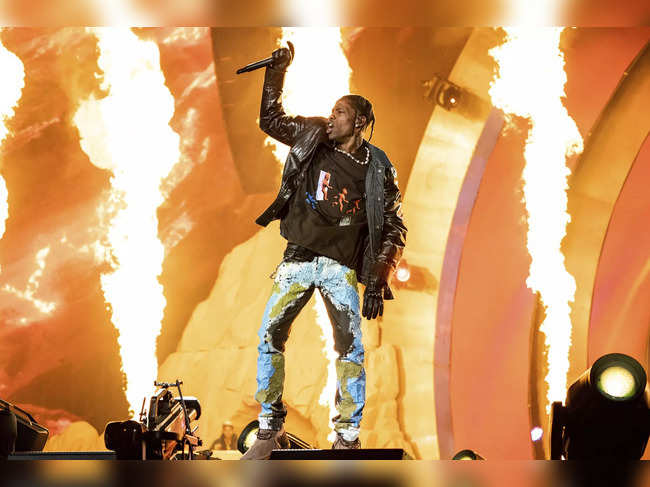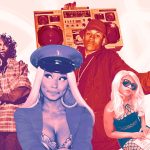Rap is not considered music due to its spoken word style and lack of traditional melodic elements. However, it has gained recognition as a form of artistic expression and cultural phenomenon, making it a legitimate genre in the modern music industry.
With its rhythmic patterns, poetic lyrics, and storytelling capabilities, rap has established its place as a unique and influential genre that resonates with a diverse audience. From its origins in marginalized communities to its global mainstream success, rap has transcended musical boundaries, sparking important social and political discussions.
Its impact on popular culture, fashion, and language cannot be denied, solidifying the cultural significance of rap beyond its technical categorization as music.

Credit: economictimes.indiatimes.com
Historical And Cultural Context Of Rap
Rap is a genre of music that has gained significant popularity over the years. However, there are some who argue that rap is not music at all. In order to understand this debate, it is important to consider the historical and cultural context of rap.
Origins And Evolution Of Rap
- Rap originated in the bronx, new york city, during the 1970s as a form of expression for african american and latino communities.
- It emerged as a response to social and economic challenges faced by these communities, including poverty and racial discrimination.
- Initially, rap was performed in street parties and block parties, with djs playing beats and emcees (rappers) delivering rhymes.
- Over time, rap evolved and became more complex, incorporating storytelling, wordplay, and social commentary.
- It has been influenced by various music genres such as funk, disco, soul, and reggae, and has embraced new technologies to innovate its sound.
Rap As A Cultural Expression
- Rap is more than just music; it is a cultural expression that reflects the experiences, values, and aspirations of marginalized communities.
- It provides a platform for artists to address social and political issues, raise awareness, and give voice to the voiceless.
- Rap often explores themes such as poverty, racism, violence, inequality, and the pursuit of the american dream.
- It celebrates and preserves cultural heritage through the use of slang, vernacular, and storytelling techniques.
- Rap lyrics are often highly personal, allowing artists to share their struggles, dreams, and triumphs with their audience.
Influence Of Rap On Society
- Rap has had a significant impact on society, shaping popular culture, fashion, language, and attitudes.
- It has been both celebrated for its artistic merit and criticized for its explicit lyrics and controversial content.
- Rap has provided a platform for social activism, addressing pressing issues such as police brutality, racial profiling, and systemic oppression.
- It has also been instrumental in giving a voice to marginalized communities, challenging stereotypes, and promoting inclusivity.
- The influence of rap extends beyond music, with many rappers becoming influencers, entrepreneurs, and advocates for change.
Rap may not fit the traditional definition of music for some, but it is an important and influential cultural phenomenon. Understanding its historical and cultural context provides valuable insights into its significance and impact on society. Whether you consider it music or not, rap continues to shape and reflect the experiences of communities around the world.
Elements Of Music In Rap
Beat And Rhythm In Rap
- Rap is characterized by its strong emphasis on beat and rhythm, which are essential elements of music.
- The beat serves as the foundation of a rap song, providing a steady and consistent pulse that drives the music forward.
- Rappers often rely on the beat to guide their flow and deliver their lyrics with precision and timing.
- Rhythm in rap refers to the patterns created by the placement and duration of sounds, emphasizing the natural cadence of spoken words.
- The combination of beat and rhythm in rap creates a unique and infectious groove that captivates listeners and gets them moving to the music.
Rhyme And Wordplay
- One of the distinguishing features of rap is its extensive use of rhyme and wordplay.
- Rap artists craft their lyrics with meticulous attention to rhyme schemes, where words at the end of lines or within verses share similar sounds.
- Rhyme adds a sense of musicality to rap and helps to create memorable hooks and catchy choruses.
- Additionally, rap often showcases intricate wordplay, where artists cleverly use language to create double entendres, puns, and metaphors.
- These linguistic gymnastics not only entertain listeners but also make rap an art form that rewards repeated listens and deeper analysis.
Musicality In Rap Production
- Apart from the verbal elements, the production aspect of rap plays a crucial role in creating a musical experience.
- Producers carefully select and arrange various musical elements, such as melodies, chord progressions, and instrumentation, to complement and enhance the rap vocals.
- The use of samples, loops, and synthesized sounds further enriches the sonic landscape of rap songs.
- Skilled producers manipulate these musical layers to create dynamic arrangements, adding depth and texture to the overall sound.
- This attention to musicality in rap production elevates the genre beyond mere spoken word and transforms it into a fully realized musical expression.
By understanding the key elements of music in rap, such as beat and rhythm, rhyme and wordplay, and the musicality in rap production, it becomes evident that rap is indeed a form of music that offers a distinctive and compelling artistic experience.
Its fusion of spoken poetry, intricate wordplay, and carefully crafted musical elements make rap a genre that continually pushes boundaries and resonates with diverse audiences. So, next time someone argues that rap is not music, you can confidently explain the musical depth and creativity that exists within the genre.
Debunking The Argument Against Rap As Music
Variety Of Musical Styles Within Rap
Rap is often criticized as not being real music because it differs from traditional genres such as classical, jazz, or rock. However, this argument fails to recognize the vast variety of musical styles within rap. Here are some key points to debunk this argument:
- Rap encompasses numerous subgenres, including gangsta rap, conscious rap, trap, mumble rap, and many more.
- Each subgenre brings its own unique elements, such as distinct rhythms, beats, and instrumentation.
- From the smooth and melodic flows of artists like kendrick lamar to the aggressive and energetic delivery of artists like eminem, rap showcases a wide range of musical styles.
Vocal And Instrumental Techniques In Rap
One common misconception about rap is that it lacks complex vocal and instrumental techniques commonly associated with other genres. However, this argument overlooks the impressive skills demonstrated by rap artists. Consider the following key points:
- Rappers exhibit intricate rhyme schemes, using techniques like multisyllabic rhymes, internal rhymes, and alliteration to create a rhythmic and poetic flow.
- Artists manipulate their delivery, adjusting their tone, cadence, and emphasis to enhance the lyrical content and evoke emotions.
- Rap songs incorporate instrumentals that are carefully crafted to complement the lyrics and enhance the overall message. These instrumentals often include sampling, live instrumentation, and creative use of synthesizers.
Artistic Expression In Rap Lyrics
Another argument against rap being considered music is the perception that its lyrics lack artistic depth. However, this overlooks the rich artistic expression found in rap lyrics. Here are some key points to consider:
- Rap artists use metaphors, similes, wordplay, and storytelling techniques to convey their thoughts, experiences, and social commentary in a creative and profound way.
- Lyrics often reflect personal narratives and express emotions, allowing listeners to connect with the artist on a deeper level.
- Rap lyrics address a wide range of topics, including social issues, politics, personal struggles, and dreams, making it a versatile medium for expressing thoughts and ideas.
Rap is a complex and dynamic genre with a wide range of musical styles, intricate vocal and instrumental techniques, and profound artistic expression within its lyrics. While it may differ from traditional music genres, it undeniably falls under the umbrella of music and continues to evolve as an influential art form.
Expert Perspectives On Rap As Music
Rap is often a subject of debate when it comes to whether or not it can be classified as music. While some argue that rap lacks the melodic qualities typically associated with music, others believe that rap is a legitimate form of artistic expression.
In this section, we’ll explore expert perspectives on rap as music, including insights from music theorists, perspectives from hip-hop artists, and the opinions of rap industry professionals.
Perspectives From Music Theorists
- Music theorists argue that rap should be considered music because it possesses many of the fundamental elements found in traditional music. Here are some key points to consider:
- Rhythm: Rap relies heavily on complex rhythmic patterns, showcasing the skills of the artists in delivering their lyrics with precision and timing.
- Poetry: Rap can be seen as an extension of poetry, with artists carefully crafting their lyrics to convey messages, emotions, and narratives.
- Beat and instrumentation: While rap may not typically involve traditional instruments, the use of beats, samples, and electronic sounds can still create a musical backdrop for the artist’s vocals.
- Structure: Rap songs often follow a distinct structure, with verses, choruses, and bridges, similar to other genres of music.
Insights From Hip-Hop Artists
- Hip-hop artists themselves argue passionately for rap’s musicality and its place within the broader music landscape. Here are some insights from their perspective:
- Artistic expression: Rap allows artists to express themselves creatively, sharing their unique stories, experiences, and perspectives with the world.
- Emotional connection: Many hip-hop artists believe that rap has the power to evoke strong emotions in listeners, similar to other forms of music.
- Musical innovations: Hip-hop artists have constantly pushed the boundaries of what is considered music, incorporating various genres and experimenting with new sounds and styles.
Opinions Of Rap Industry Professionals
- Professionals within the rap industry also offer compelling arguments for rap being classified as music. Here are some notable opinions:
- Cultural significance: Rap has had a significant cultural impact and has become a prominent form of musical expression for marginalized communities, showcasing their realities and struggles.
- Commercial success: Rap has achieved commercial success on a global scale, demonstrating its mass appeal and ability to resonate with audiences worldwide.
- Evolution of music: Many industry professionals argue that rap represents the evolution of music and reflects the changing tastes and preferences of contemporary society.
While the debate about whether rap is music continues, expert perspectives from music theorists, hip-hop artists, and rap industry professionals shed light on the various elements that make rap a distinct form of musical expression. Whether it’s the rhythmic patterns, poetic lyrics, or cultural significance, rap has undoubtedly left an indelible mark on the music industry and deserves recognition for its unique contributions.
Benefits And Impact Of Rap As Music
Rap is often a highly debated genre, with some arguing that it is not music at all. However, the impact and benefits of rap as music cannot be ignored. In this section, we will delve into the reasons why rap is indeed a powerful form of music and the significant influences it has had on storytelling, society, and other music genres.
Rap As A Form Of Storytelling
- Rap music is unique in its ability to tell stories through intricate lyrics and rhythm.
- Through rap, artists have the freedom to express their personal experiences, struggles, and triumphs in a creative and engaging manner.
- The rhythmic flow of rap enables artists to convey their emotions and messages with intensity and passion.
- The narrative element of rap allows listeners to connect with the stories being told, providing a platform for empathy and understanding.
Social And Political Impact Of Rap
- Rap has often been a vehicle for addressing social and political issues.
- This genre has given voice to marginalized communities, shedding light on their struggles, inequalities, and perspectives.
- The raw and unfiltered nature of rap lyrics has sparked conversations about race, class, gender, and other important social issues.
- Through rap, artists have the power to challenge the status quo, raise awareness, and advocate for change.
Influence Of Rap On Other Music Genres
- Rap’s influence extends beyond its own genre, permeating various other forms of music.
- The fusion of rap with rock, pop, r&b, and electronic music has resulted in innovative and diverse musical collaborations.
- Rap has pushed the boundaries of music, inspiring artists from different backgrounds to experiment with new sounds, rhythms, and styles.
- The integration of rap elements into other genres has led to the evolution and growth of music as a whole.
Rap should be recognized and appreciated as a form of music due to its ability to tell stories, impact society, and inspire other genres. Whether you are a fan or not, there’s no denying the significant contributions rap has made to the music industry.
So next time you debate whether rap is music, consider the power of its storytelling, its influence on society, and the way it has shaped other musical genres.
Frequently Asked Questions Of Rap Is Not Music
Is Rap Considered As Music?
Rap is a genre of music that combines spoken word with rhythmic beats. It has its roots in african and african-american culture and has evolved over time to become a powerful form of artistic expression. While some may argue that rap is not music, it is important to recognize and appreciate its unique style and impact on the music industry.
Why Do People Say Rap Is Not Music?
Some people argue that rap is not music because it does not conform to traditional musical conventions such as melody and harmony. However, rap is a form of music that relies heavily on rhythm, lyrics, and storytelling. It has its own distinct style and has become incredibly popular and influential in the music world.
What Makes Rap Different From Other Genres?
Rap stands out from other genres of music due to its focus on spoken word and storytelling. It often addresses important social issues, shares personal experiences, and conveys powerful messages. The rhythmic flow and wordplay used in rap sets it apart from other forms of music, making it a unique and impactful genre.
Conclusion
While there may be differing opinions on the matter, it is clear that rap has evolved into a powerful form of artistic expression. Its unique blend of rhythm, rhyme, and wordplay allows artists to tackle complex social issues and illuminate personal experiences in ways that resonate deeply with listeners.
Whether it’s addressing systemic inequalities, sharing stories of triumph over adversity, or simply providing an outlet for creative expression, rap has undeniably made its mark on the music industry. Through its ability to captivate audiences with its raw and unfiltered narratives, rap has transcended traditional boundaries and continues to shape culture and society.
As listeners, we must approach rap with an open mind and recognize its significance as a musical genre that reflects the realities of our world today. So, even though rap may not fit the conventional definition of music for some, its impact cannot be denied.
It is an art form that has found its place and deserves respect for its cultural significance and ability to connect people globally.













